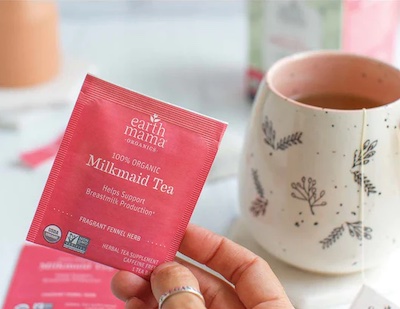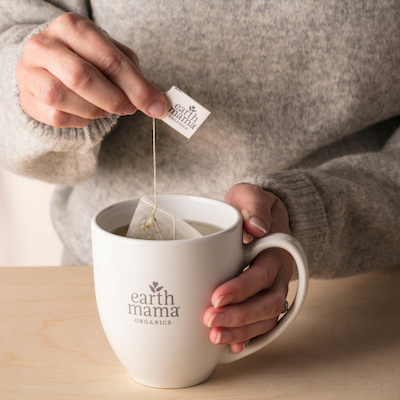
Medically reviewed by Macy Tollefson – doula, breastfeeding specialist & prenatal yoga teacher
Breastfeeding can be overwhelming, and feeling concerned over your milk supply only adds to your stress. While there are many different ways to increase your breastmilk supply, I know it can be so hard to know what is the best choice for you and your baby.
Lactation teas are a popular option, but do they really help boost your milk supply? And do the benefits outweigh the risks?
If you are struggling to produce enough milk to feed your baby and are looking for natural ways to increase your supply, keep reading to see if lactation tea could be the right choice for you!
This article is not a substitute for medical advice.
What Is A Lactation Tea?
Lactation teas are blends of different galactagogue herbs, marketed to help breastfeeding moms increase milk production1. The galactagogues (also known as lactation inducers or milk boosters) help stimulate prolactin, which is responsible for the production of breast milk.
Most tea blends are designed to be consumed multiple times a day throughout your breastfeeding journey, to help you increase milk supply. They can act as an additional supplement for other techniques that also help create more breast milk.
Check out my other article with tons of useful breastfeeding hacks for new moms – to make nursing easier for you and find out what essentials you should stock-up on.
Does Lactation Tea Actually Work?
Science says that while these herbs DO have lactation inducing properties, not enough research has been done to determine if it is a good fit for all nursing mothers.
One study completed a randomized trial, where half of the nursing mothers received lactation tea, and the other half received a placebo. The breastfeeding women who received the lactation tea had significantly higher breast milk production than the placebo and control groups2.
While this study had positive findings, many others were inconclusive. This suggests that herbal teas alone may not be enough to significantly improve milk supply. The bottom line is more information from well-controlled trials of breastfeeding mothers who have low milk volume is needed3.
While scientific studies may not be conclusive, anecdotal evidence is much stronger. Many mothers believe that lactation tea and lactation cookies helped their body produce more milk, and improved their feeding journey.
At the very least, drinking caffeine free, herbal tea multiple times a day CAN help you stay hydrated, feel a sense of relaxation, and have a moment for yourself to de-stress – which is essential for maintaining your breast milk supply.
| PRO TIP: Check out my list of the best lactation teas that are effective and recommended by many moms! |
What Kind Of Tea Is Good For Lactation?
There are a wide variety of lactation teas, cookies and supplements available on the market, that all claim to help boost your milk supply. It’s important to look at the ingredients of these products and see which ones could be more beneficial.

Some of the most common herbal ingredients you may find in lactation teas are:
- Fenugreek
- Blessed thistle
- Fennel
- Stinging nettle
- Goat’s rue
- Moringa
- Milk thistle
- Dandelion
- Marshmallow
Each of these herbs have been shown to positively affect breast milk production by either stimulating the mammary glands, increasing prolactin, or igniting your dopamine-receptors4.
These herbs also provide other unique health benefits (ex. helping with digestion, providing anti-oxidants, or decreasing inflammation), but they come with their own set of side effects. Always follow the recommended dosage, and stick with organic blends, to be safe.
Other common galactagogue herbs (milk boosters) that are found in lactation products include shatavari, silymarin, garlic, and malunggay.
How Does Lactation Tea Work?
Most herbs included in lactation tea work with the mother’s body to boost her milk flow by stimulating prolactin, or supporting the mammary glands and cells.
Prolactin is an essential hormone needed to breastfeed, and is ultimately responsible for milk production. Herbs such as fenugreek, fennel, blessed thistle, goat’s rue, dandelion and marshmallow ALL stimulate prolactin in your body, thus help produce more breastmilk.
Another way some herbs increase milk supply is by supporting the mammary glands, which is where the milk is produced. Fennel, goat’s rue and blessed thistle are examples of herbs that specifically help with mammary growth and support.
The main ingredient in the lactation tea you choose should be an active herb (like fenugreek, fennel, or blessed thistle) that support your breast in some way. Other herbs (such as mint, hibiscus or rooibos) or can then be added for taste.

How Long Does It Take Lactation Tea To Work?
Unfortunately, this answer is different for everyone. It really depends on the specific herbs that are in your tea, and how often you are drinking them.
With regular use, some moms claim they saw an increase in their milk supply within 24-72 hours, while others say it can take up to two weeks.
Teas with a strong lactation inducing herb, such as fenugreek may be more effective, and allow you to see results sooner.
When Should I Start Drinking Lactation Tea?
You can begin drinking lactation tea as soon as your baby is born, however it may not be necessary to start so soon.
Keep in mind that your milk will not come in until around 3-5 after your baby is born. Before that happens, your body will create small amounts of colostrum, which is all that babies need to meet their nutritional needs, until your milk comes in.
Most women are able to make enough milk for their babies and don’t require supplementation. For this reason, I would recommend drinking lactation tea only once you notice a slight decrease in your supply.
For major supply decreases or other issues, always consult your doctor or lactation consultant.
How Often Should I Drink Lactation Tea To Boost My Breast Milk Supply?
It’s important to follow the guidelines of the specific tea you choose to drink, but most blends recommend you consume around 3 cups a day.
One cup of lactation tea is not enough to really be increasing breast milk supply, and it will require frequent consuming throughout your day, for en extended period of time.

When To Drink Lactation Tea?
Fully breastfeeding mothers AND women who prefer pumping their milk can both benefit from lactation tea.
It is designed to help increase and maintain your breastmilk, so if you feel like you could use more milk, lactation tea could be a good option for you.
In some cases, you can brew a cup of tea before every feeding or pumping session. To do this, simply add a one tea bag to a cup of boiling water and steep for the recommended time.
Tip: If you find the tea is too bitter, try adding apple juice to sweeten it up!
Can I Drink Lactation Tea While Pregnant?
While some herbal teas are safe to consume during pregnancy (within moderation), there are many herbs that are NOT safe- including those in lactation teas.
Some popular milk boosters that are NOT safe to consume during pregnancy include:
- Stinging nettle, as it can stimulate uterine contractions5.
- Fennel, which activates estrogen, and can confuse your other pregnancy hormones6.
- Fenugreek, which has been linked to birth defects7.
There are many other herbs that are not safe for pregnancy, so please do your research and talk to your doctor. The bottom line is, it’s probably best to avoid lactation tea during pregnancy.
If you are currently breastfeeding one child AND pregnant at the same time, there are safer ways to increase your milk supply that do not involve lactation tea. It’s best to consult your doctor or lactation consultant about these options.
What about if you’re not pregnant or lactating but you take lactation tea, what happens? It’s likely ok to consume herbal teas when not pregnant or breastfeeding, as long as you are aware of the potential side effects.

Frequent Urination When Drinking Lactation Tea
It’s normal for new moms to experience frequent urination after giving birth, as the pelvic floor muscles are stretched and bladder support is weakened. On top of this, breastfeeding women need to drink more water to produce a healthy amount of milk for their baby.
If you are frequently drinking herbal tea to assist with your milk supply, this can also be adding to your increased fluids and need to urinate more often.
On the other hand, some milk boosting herbs (such as fenugreek) are actually used to help treat frequent urination! If you are concerned about your urination amount, don’t hesitate to reach out to your doctor.
Side Effects Of Drinking Tea For Milk Production
Every herb included in lactation tea comes with their own set of side effects.
The most common side effect of lactation tea herbs is gastrointestinal issues, such as bloating or upset stomach. Always be sure to do your research and see which herbs would be best for you.
For example, consuming fenugreek can lead to side effects such as8:
- Heartburn
- Abdominal pain
- Upset stomach
- Loose stools
- Lightheadedness
- Changes in baby’s urine and sweat odor9
Safety Tips
Always follow the proper dosage and instructions on the package of your tea. If you were prescribed a tea from a medical professional, follow their instructions as well10.
Keep in mind that just because something is “natural” does not always mean it is safe. As mentioned above, many herbs can have adverse effects if not consumed safely.
Most of the herbs discussed in this article interact with the hormones in your body (ex. estrogen), so it’s likely not be the best choice if you have a history of hormone-sensitive cancers11.
If your baby is losing weight, it is VERY important that you let your doctor or paediatrician know right away. This is a telltale sign that they are not getting enough milk and intervention may be required.
DO NOT rely on lactation tea alone to help your baby get more milk. There are many different methods that can boost milk supply, which a medical professional will help you with.
Article By Macy Tollefson
Macy Tollefson is a full spectrum doula, breastfeeding specialist and prenatal yoga teacher. She is passionate about guiding the modern mama on her journey through the beautiful (and wild) transformation of pregnancy, birth and postpartum. Macy envisions a world where every mother has access to the resources she needs, and follows her intuition to make the best decisions about what is right for her and her baby.
The purpose of this article is informative. It’s not a substitute for professional medical advice or medical care. Remember: safety first! Consult your doctor/pediatrician in case of any doubts. The author of this article does not accept any responsibility for any liability, loss or risk, personal or otherwise, incurred as a consequence, directly or indirectly, from any information or advice contained here.
References:
https://www.healthline.com/
https://www.ncbi.nlm.nih.gov/
https://flo.health/
https://www.nccih.nih.gov/
https://www.womenshealthmag.com/

